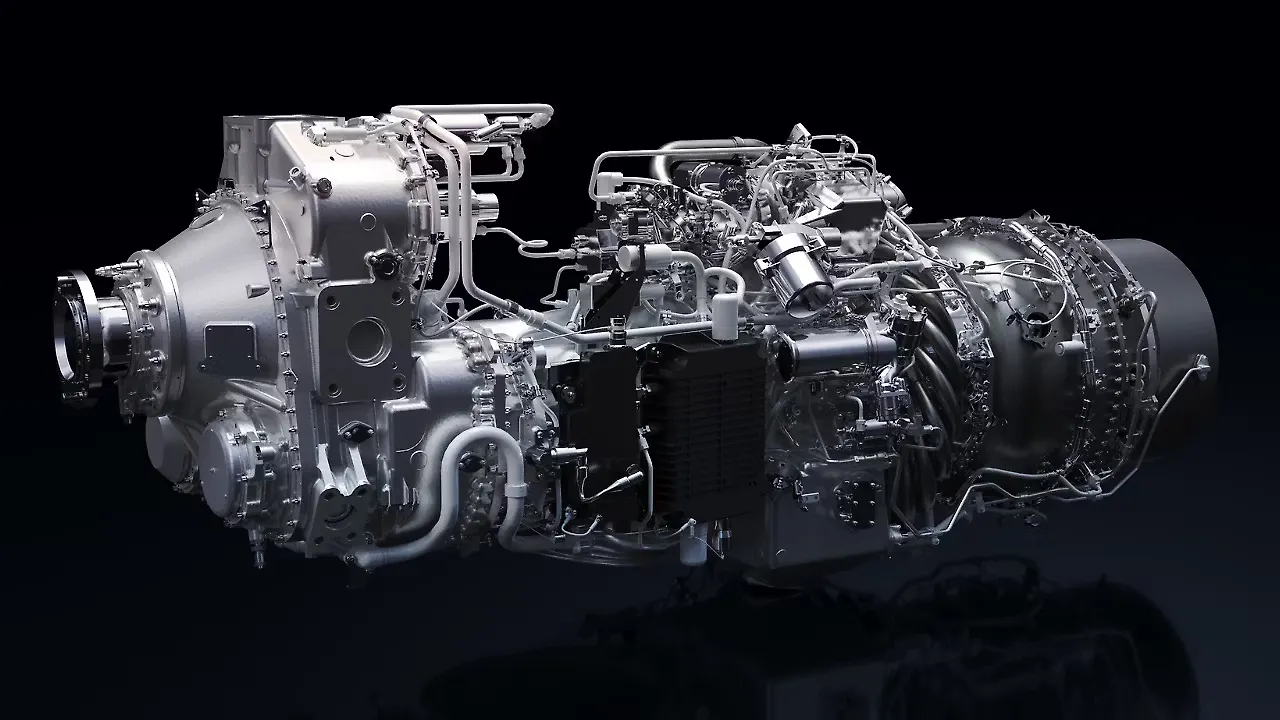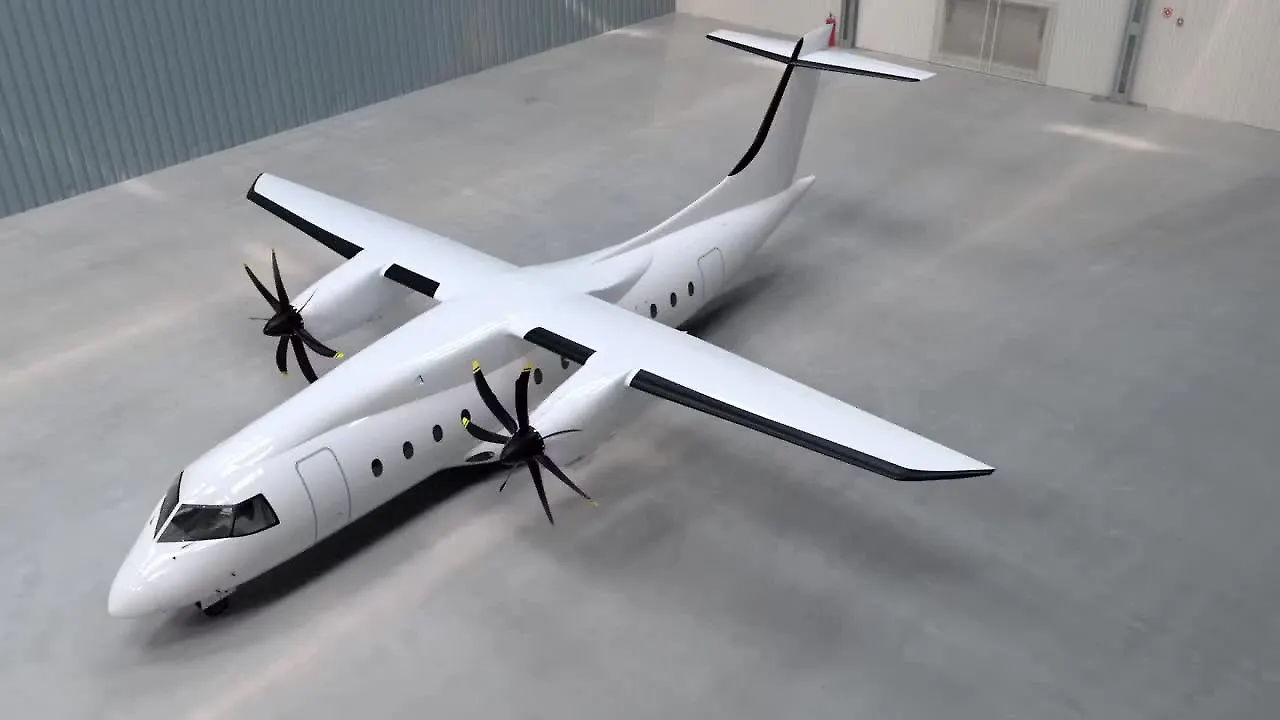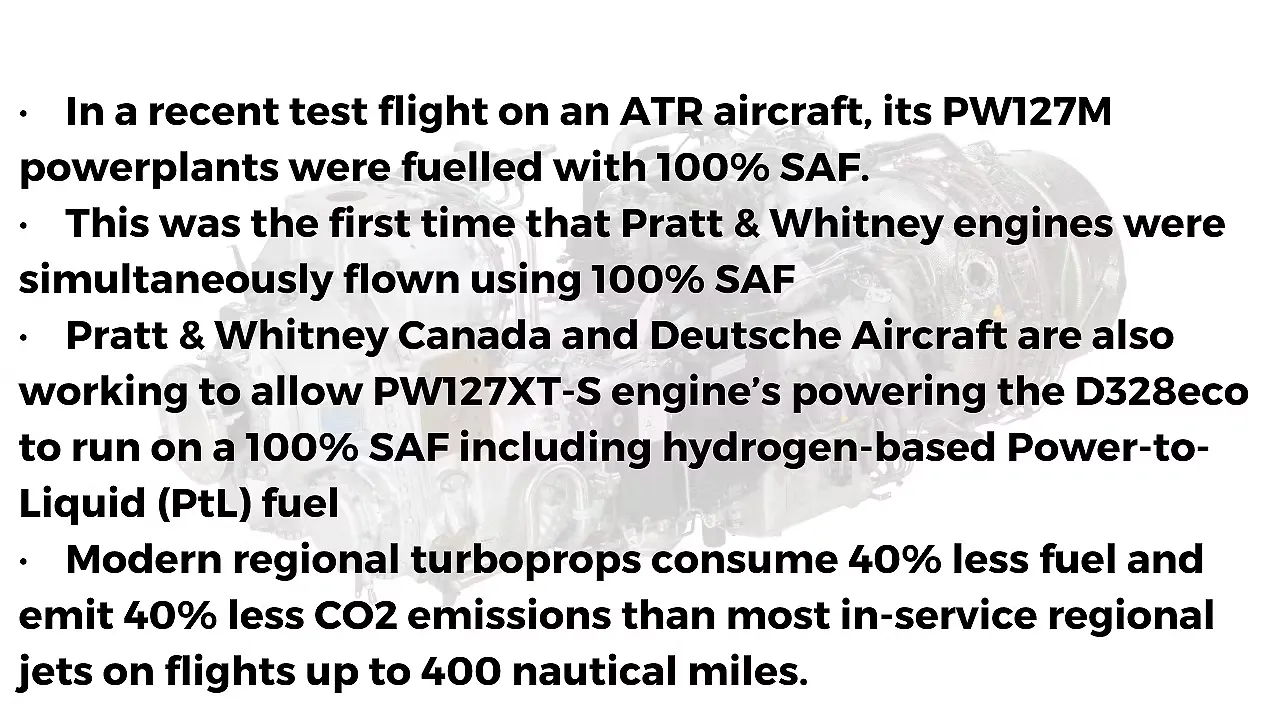
With the aviation industry working hard to achieve net-zero carbon emissions by 2050, engine manufacturers such as Pratt & Whitney have worked hard to make their aero-engines fly on 100% Sustainable Aviation Fuel (SAF).
The most recent success in this arena was the flight made in June by an ATR72 aircraft belonging to Braathen Regional Airlines of Sweden, whose PW127M Engines were fuelled with 100% SAF. In addition, in June, Pratt & Whitney Canada (PWC), a business unit of Pratt & Whitney, announced that its new PW127XT-S engine had been selected to power Deutsche Aircraft’s D328eco regional turboprop. Both firms have agreed to work together to allow PW127XT-S engine’s powering the D328eco to run on a 100% SAF including hydrogen-based Power-to-Liquid (PtL) fuel.
Sustainable Flight
The June test flight of the Braathen aircraft was the first time Pratt & Whitney engines have flown simultaneously using 100% SAF. The flight also made the ATR72, the world’s first turboprop to make a flight on 100% SAF. ATR CEO Stefano Bortoli said the recent test flight would allow the airframer to certify its aircraft to fly solely on sustainable fuels faster and enable more sustainable air links. 'The flight represents a true milestone for the entire aviation industry as it shows that this technology works and can be promptly adopted by many in our industry to speed up the transition to zero-emission aviation,' he said.

The flight test was a collaborative effort between ATR, PWC and the airline in their quest to reduce carbon emissions from aviation. “We are extremely pleased with the successful testing of our PW127M engines on 100% SAF,” said Timothy Swail, Vice President, Regional Aviation and APU Product Marketing and Sales for PWC. Neste MY Sustainable Aviation Fuel was used exclusively on both of the aircraft’s PW127M engines over a two-hour test flight, which took place in Europe.
PWC engines have been 50% SAF compatible since the late 2000s, and the company will now prepare for the future potential of using 100% SAF as a drop-in solution for aviation. Compared to the traditional use of kerosene, SAFs can reduce emissions by up to 80%. Commercial aircraft today are certified to fly on 50% SAF blends.
PW127XT-S Makes New Mark
The selection of the PW127XT-S engine by Deutsche Aircraft to power its D328eco regional turboprop marked another milestone for PWC. The XT engine series is a new derivative of the PW127 family and were first announced in November 2021 as the new engine for the ATR 72 and 42 Regional Transport Aircraft.
The PW127XT-S engine is another model in the XT series and will be developed according to the D328eco timeline. “We have worked closely with the D328eco team over a number of years to develop the best engine option for the aircraft,” said Maria Della Posta, President, PWC. 'The PW127XT-S provides airlines 40% more time on the wing, a 20% reduction in maintenance costs with only two scheduled events over ten years, and a 3% improvement in specific fuel consumption.'
The D328eco is amongst a new generation of climate-friendly, highly efficient regional aircraft now under development. According to Dave Jackson, Managing Director, Deutsche Aircraft, turboprop technology remains the most efficient and eco-friendly form of regional air transport available in the world. “It is key that the major airframe and engine OEMs set out ambitious yet realistic timelines and capabilities to use novel propulsion technologies in combination with de-carbonised fuel capabilities,” said Della Posta.
Jackson said Deutsche Aircraft was not only looking to achieve the maximum CO2 emissions reduction possible but also for real operative propulsion efficiency improvements compared to existing technology. “This would mean a reduction in the order of 15-25% block energy on a typical regional mission,” he said.

PWC and Deutsche Aircraft have agreed to continue working together to develop a technology roadmap for implementation, test, and verification of the PW127XT-S engine and its innovative propulsion technology, within the D328eco programme. The roadmap will focus on the capability to operate the two most promising net zero / zero CO2 fuels: PtL and hydrogen, respectively. Towards this end, both PWC and Deutsche Aircraft will assess the impact of these fuels and related technologies and operations to derive the requirements and solutions for the application.
These are essential steps in the path towards reducing aviation emissions. Turboprop aircraft are the preferred choice for reducing aviation emissions in short-haul sectors. Modern regional turboprops consume 40% less fuel and emit 40% less CO2 emissions than most in-service regional jets on flights up to 400 nautical miles. These efficiencies are only expected to grow as new generation turboprop engines enter service in the coming years.